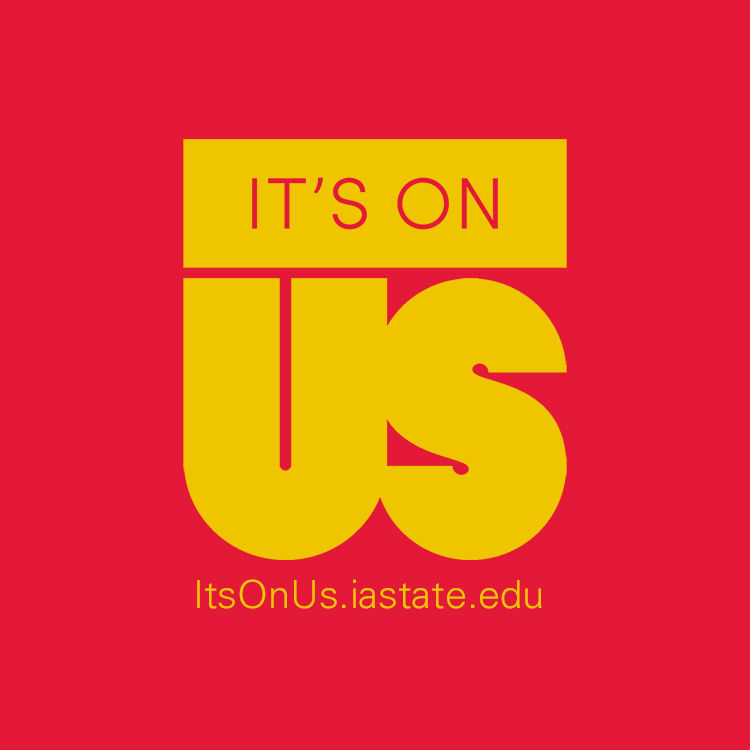It’s On Us campaign shifts attention toward preventing sexual assault
Iowa State is participating in the It’s On Us national sexual assault campaign implemented by the White House administration in September.
November 20, 2014
It’s on us to end sexual assault. It’s on us to take action. It’s on us to never blame the victim.
Those statements are the foundation of the national It’s On Us movement that has been designed to end sexual assault on college campuses.
Iowa State is participating in the kick-off week of the national sexual assault campaign implemented by White House administration in September. It has been designed to train students on bystander techniques and to promote awareness of sexual assault on college campuses across the country.
“It’s more about bystanders. How to not just be a bystander. It’s about being active,” said Robinette Kelley who works as a Title IX administrator in the Office of Equal Opportunity.
Kelley is organizing faculty and staff participation in the campaign and working with Hillary Kletscher, Government of the Student Body president, to engage the student body.
The Iowa State Police Department, Thielen Student Health Center and other organizations are working alongside Kelley and Kletscher to customize and promote the It’s On Us campaign across the university.
“It’s very collaborative,” Kletscher said. “We have a lot of people at the table, but I think long-term is what’s going to make it successful.”
By working with a variety of different organizations, Kletscher said she is confident that different perspectives are being represented. Kletscher said that it is important to have as many campus organizations involved during the planning process as possible in order to make this an effective effort.
“Sexual assault is something that is life-altering,” Kletscher said. “If we can prevent that or help students, then that’s what we need to do.”
During the fall semester, Kletscher wanted the Iowa State community to know that the university is invested in the It’s On Us movement. Kletscher said that she wants to focus on long-term prevention and work to educate the community about resources that are available to victims.
Kletscher said she also wants to see more conversation and prevention about sexual assault before and during any possible sexual assaults, instead of conversation being focused on resources available after an assault.
Anthony Greiter, community outreach officer for the ISU Police Department, said that every officer with the ISU PD is trained to respond to sexual assault reports. They also have a sexual assault response team that consists of 11 officers. These 11 officers are specially trained and go through more extensive training regarding sexual assault.
“[Sexual assault] is everywhere. It’s one of the most underreported crimes and part of that is the culture that we live in,” Greiter said.
Greiter said that today’s society tends to blame the victim for being assaulted and sympathize with the perpetrator. He said that victims may be afraid to report the assault due to society’s viewpoint.
“Having this movement is important so victims of sexual assault don’t stay silent,” Kletscher said.
Being aware of sexual assault and the It’s On Us movement around campus is just the first step. Students, faculty and staff will also be given the opportunity to take a pledge to end sexual assault.
By taking the pledge, students, faculty and staff are acknowledging that sexual assault exists and that they will no longer be bystanders. Greiter said that by pledging, people will continue to learn about issues so that they can make an impact.
Kelley said that in order to have continuous promotion of the campaign, there will be a large social media push. ISU PD has began to personalize the campaign by creating a video featuring President Steven Leath among other faculty, staff and students saying “It’s on us”.
“I envision a continuous campaign, and I think that students are on board,” Kelley said. “If we can all as a community decide that we will not tolerate [sexual assault], I think we can improve.”
Kletscher will be working to make sure that the conversation stays alive and that students, faculty and staff continue to stay engaged in the movement as well as in prevention techniques.
“We are a close-knit campus community and so I really think that will help this be successful,” Kletscher said. “It’s on all of us to take care of other cyclones.”

















